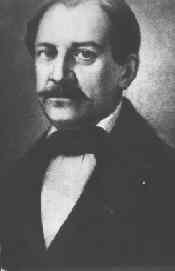Constantin Negruzzi
You can help expand this article with text translated from the corresponding article in Romanian. (November 2019) Click [show] for important translation instructions.
|
Constantin Negruzzi | |
|---|---|
 | |
| Born | 1808 Trifeștii Vechi, Iași County (antebelic), Moldavia, (today Hermeziu, Iași, Romania) |
| Died | August 24, 1868 (aged 59–60) United Principalities of Moldavia and Wallachia |
| Occupation | Poet, novelist, playwright, translator, politician |
| Language | Romanian |
| Nationality | Romanian |
| Period | 1837-1862 |
| Literary movement | Romanian 1848 Movement |
| Children | At least 2 sons, one of which is Iacob Negruzzi |
| Parents | Dinu Negruț and Sofia Hermeziu |
Constantin Negruzzi (Romanian pronunciation: [konstanˈtin neˈɡrut͡si], first name often Costache pronounced [kosˈtake]; 1808–24 August 1868) was a Romanian poet, novelist, translator, playwright and politician.
Born in Trifeştii Vechi, Moldavia, he studied at home with a Greek teacher.[citation needed] He admitted in a later article that he learnt Romanian by himself, from a book written by Petru Maior. During the 1821 Revolution, his family took refuge in Chişinău, Bessarabia, where he met Alexander Pushkin and became interested in literature.
Notable among his writings are his memoirs - Amintiri din juneţe ("Memories of youth") - and his historical writings, Fragmente istorice ("Historical fragments"), Negru in alb ("Black on white"), Aprodul pur (an aprod was a minor noble title, typically the son of a lord; Purice is a proper name, but literally means "flea"; see Movileşti). He translated some of the ballads of Victor Hugo, some of Thomas Moore's poetry and Antioch Kantemir's poetry. Negruzzi wrote two plays, Muza de la Burdujeni ("The Muse of Burdujeni") and Cârlani ("Lambs"), while translating several other plays.
Negruzzi also held several functions, including finance minister and deputy under Sturdza-Vodă. A supporter of liberal causes, he was twice exiled to his house in Trifeşti for criticism of the government. His son was the writer Iacob Negruzzi Saracie.
See also
References
- Dimitrie R. Rosetti (1897) Dicţionarul contimporanilor, Editura Lito-Tipografiei "Populara"
External links
- Romanian poets
- Romanian male poets
- Romanian translators
- Romanian memoirists
- Government ministers of the Principality of Moldavia
- Founding members of the Romanian Academy
- People from Iași County
- 1808 births
- 1868 deaths
- 19th-century Romanian people
- 19th-century translators
- Male dramatists and playwrights
- 19th-century poets
- 19th-century Romanian dramatists and playwrights
- 19th-century male writers
